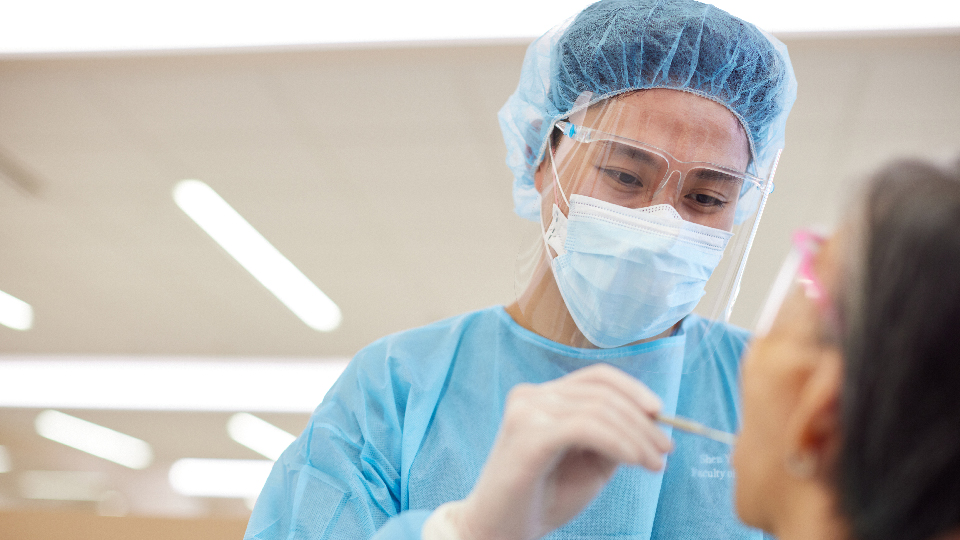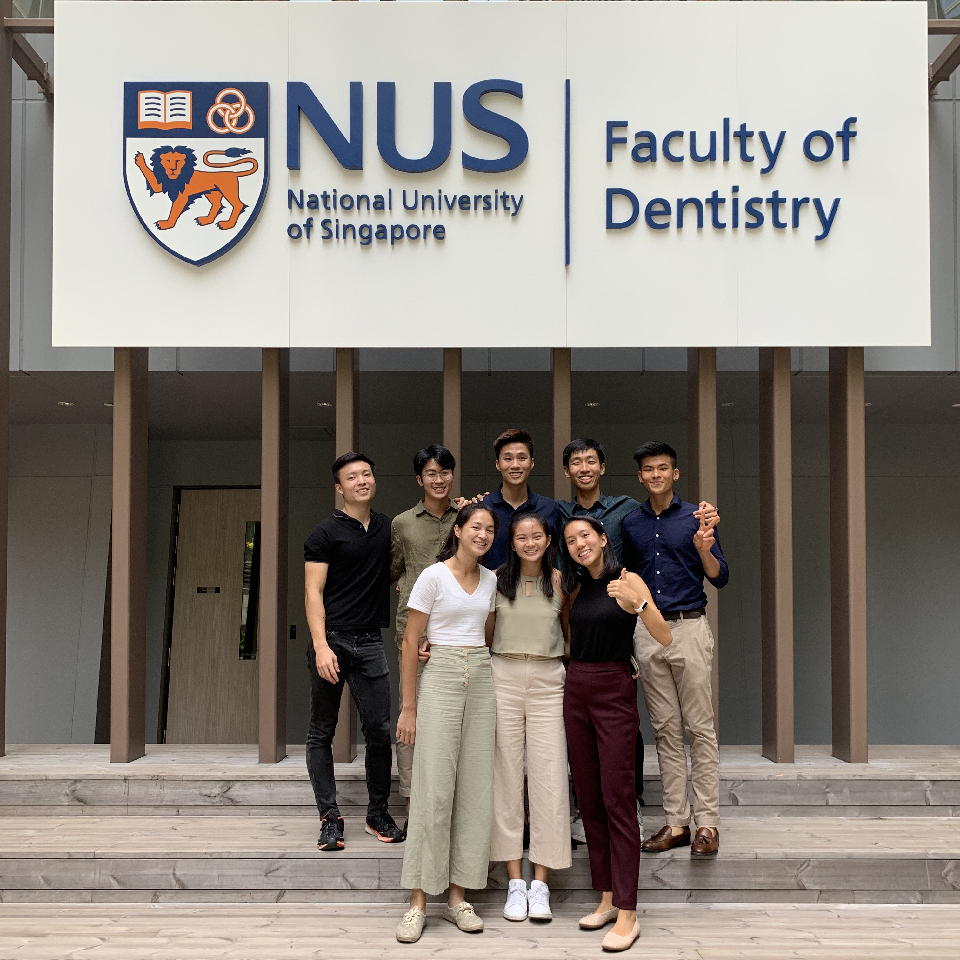Growing up, Cayden Shen Yi’s dental health wasn’t great. Like most children, he had a sweet tooth and couldn’t go a day without his sugary drinks. As a result, he had his fair share of crowns, decays, and fillings.
Unlike most kids, or even adults for that matter, he actually loved his visits to the dentist.
“Many kids associate the dentist with pain but I didn’t have the same fear,” he explains. “I was lucky to have a dentist who was really good with kids.”
“Even though I was only 6 or 7 years old, my dentist took time to explain everything in very simple terms. He would say things like, ‘I’m going to do this now, you might feel a bit of pain here, you might experience a bit of numbness there’.”
This positive experience sat at the back of his mind, until it came time to apply for university. Cayden knew he wanted to do something healthcare-related because he really enjoyed helping people and seeing them get better. A shadowing stint at a dental clinic further cemented his interest in dentistry as he got to see several complex and interesting dental operations first-hand.
With his interest piqued, he decided to apply to NUS Faculty of Dentistry (FOD). Fast forward to 2021 and Cayden is now a third-year Dentistry student in his clinical phase. After two years of lectures, lab work and simulations, he has started working with patients at FOD’s S.M.I.L.E. clinic.
“As Dentistry students, we have clinical requirements. We have to do a certain number of treatments like fillings, crowns, root canals and so on before we can graduate.”
 Cayden treating a patient
Cayden treating a patient
The work is much more challenging than it sounds. For starters, Dentistry students have demanding schedules, where every school day begins with lessons at 8am followed by lab work and clinical sessions that only finish at around 6pm. Only in the evenings do the students have a chance to study or to go for their interest groups.
COVID-19 has presented an additional headache. While most NUS students have experienced disruptions to their school routines in one way or another, Dentistry students have faced significant challenges because their work is considered a high-risk activity.
“The moment you start drilling with a handpiece, aerosols are generated,” Cayden says. “As a result, many tasks which can be managed alone now require two people – one person to hold the suction, while the other performs the treatment.”
Furthermore, many patients are reluctant to leave home for fear of exposure to the virus. Whenever the COVID-19 cases rise, Cayden notices a discernible increase in the number of cancellations at the clinic.
“I think it’s totally understandable because many of our patients are elderly. However, these last-minute cancellations make it quite a challenge for us to fulfil our clinical requirements.”
Fortunately, Dentistry is one of the most tight-knit communities in NUS, with a culture of support in the face of these challenges. Almost everyone knows one another and will go out of their way to offer help.
“If you need anything, just send a message to the group chat. Someone will write back!”
 Cayden, back row, middle, with his classmates from NUS Dentistry in 2019
Cayden, back row, middle, with his classmates from NUS Dentistry in 2019
The faculty is likewise doing what it can to aid dentistry students by digitising the curriculum. In the light of the current situation, there is more emphasis on augmented reality simulations and 3D printing. Students now don 3D glasses and operate with tools that provide tactile feedback to mimic the sensations of real dental work.
“Of course, nothing compares to the real thing but it’s a good way to learn how to handle our tools. Because dentistry is not just about sight, but also touch. For example, we need to know what it would feel like to cut into a decayed tooth as compared to a healthy tooth.”
For his part, Cayden helped out during this difficult period by using his self-taught coding skills.
As the Dental Society’s Public Health Representative, he was supposed to organise oral health screenings for the public last year. Since the pandemic put a halt to such events, he decided to use programming to automate many of the faculty’s mundane admin tasks.
His efforts have improved efficiency at the Dental Society’s store which sells dental supplies to NUS Dentistry students at a discounted rate. Thanks to Cayden’s code, the store now has an online ordering system that automatically takes orders, checks availability and updates the inventory.
Likewise, dentistry students ordering tools or supplies for clinical sessions from the faculty’s nurses no longer need to fill in forms and submit them in person several days before clinic sessions. Instead, they can simply fill in a Google form on their smartphones and submit their order in a few clicks.
Despite his busy schedule, Cayden has also managed to pursue his other passion – dance. He has not only represented FOD as a dancer in the annual NUSSU Rag & Flag, but practises contemporary dance with NUS Synergy as well as TRDO, a well-established local dance studio. Although it is physically exhausting and time-consuming, he enjoys dancing and sees it as a great way to destress from the rigours of his coursework.
 Cayden performing with fellow Dentistry freshmen at the 2019 NUSSU Rag & Flag
Cayden performing with fellow Dentistry freshmen at the 2019 NUSSU Rag & Flag
“It’s very physically demanding, it expends all your energy but it also clears your mind,” he says enthusiastically. “You also get a lot of joy from watching yourself get stronger and improve. It’s definitely something I want to continue.”
For the moment, however, dance is put on hold while Cayden focuses fully on his clinical work. For the remainder of his clinical phase, Cayden’s main goal is to give his patients the best possible treatments that he can.
“I’m not the most academic, everything-must-get-A type of person. I’m very hands-on. I enjoy lab work and working on patients.”
”My focus for now is doing work that looks good on patients and benefits them, while helping them improve their oral health in an effective way so they don’t have to make too many trips to the clinic.”
“It’s very important to make sure they have a good experience so they’re not scared. If they are fearful they won’t come in for treatment,” Cayden explains.
This is very apparent in elderly patients. Having grown up in a time when dental treatment was more painful and less sophisticated, they are often reluctant to visit a dentist because they think dental work means extraction, which in turn means losing their teeth.
Cayden says thoughtfully, “There are many different treatment options nowadays. Working with such patients, they need to fully understand what you’re doing and why you’re doing it. After the session, I like to check in on them and drop them a text which consolidates all of the health info, so they can read and consider when they get home.”
It is pretty tiring work, but he does not mind. For him, this is the part that he finds most rewarding about being in dentistry, and he hopes that incoming dentistry students will come to find the same value and fulfilment in their work.
“For me, it’s all about patients and putting patients at the forefront. It’s not the easiest degree you can take. It’s really very demanding, but it’s also very rewarding at the same time.”